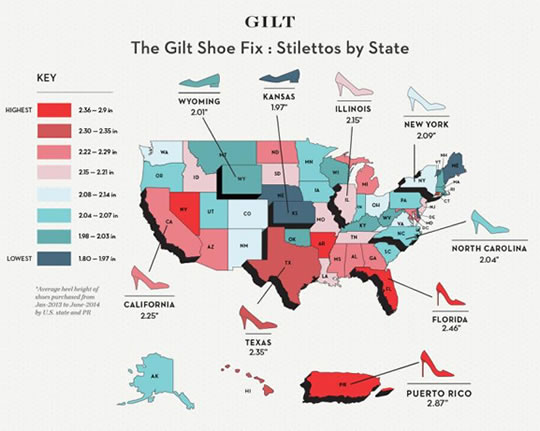How fashion helps us fit in with others as well as sets us apart.
When women move to a new city they take note of the height of other women’s high heels.
Then they tend to copy the heel-height worn by affluent women and ignore the heels of less affluent women.
Professor Kurt Gray, author of new study analysing shoe purchases by women, said:
“In other words, women want to look like the rich girls, and different from the poor girls.”
The researchers call this ‘trickle down conformity’: the idea that fashion tends to trickle trends down from above.
Cheaper retailers watch the latest fashions in Italy, but the Italians don’t pay much attention to Walmart.
The image below shows the average height of heels sold around the US.

It is all down to status, says Professor Gray:
“From the beginning of time, people have thirsted for respect and social standing, and have aligned themselves with the powerful and distanced themselves from the powerless.
So it makes sense that they do the same with heel sizes.”
While the research only involved women, a similar phenomenon is likely to be seen in men, although probably not in the purchase of high heels.
Professor Gray said::
“Men do the same thing when they purchase clothes, electronics or cars.
When you move from Wichita to LA, you look around and sell your Chevy for a BMW, but when you move from Los Angeles to Wichita, Kansas, you look around, and then just keep the BMW.”
Fashion, explained Professor Gray, is about fitting in and also about distinguishing yourself from others:
“We often think of fashion as something frivolous, but it’s an industry worth $1.7 trillion annually, and clothing often helps define ourselves.”
The study was published in the journal PLOS ONE (Galak et al., 2016).
Image credit: Gilt

